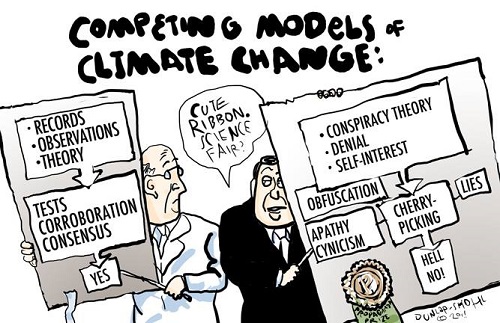2013 SkS Weekly Digest #24
Posted on 17 June 2013 by John Hartz
SkS Highlights
On May 15, the peer-reviewed paper, Quantifying the consensus on anthropogenic global warming in the scientific literature was published in the scientific journal, Environmental Research Letters (ERL). The paper presents The Consensus Project (TCP) – a survey of over 12,000 peer-reviewed climate science papers by our volunteer, citizen science team at Skeptical Science. The analysis found a 97% consensus among papers taking a position on the cause of global warming in the peer-reviewed literature that humans are responsible.
Since its online publication, Quantifying the consensus on anthropogenic global warming in the scientific literature has been downloaded more times than any other paper in ERL history, over 54,000 times.
Toon of the Week

H/T to I Heart Climate Scientists Facebook page.
Quote of the Week
Globally, the direction we are on is not the right one. If it continues, the increase would be as high as 5.3 degrees – and that would have devastating effects on all of us. - Fatih Briol, IEA
Two-thirds of energy sector will have to be left undeveloped, Bonn conference told by Frank McDonald, June 12, 2013, The Irish Times
Report of the Week
World Energy Outlook Special Report, Redrawing the Energy-Climate Map released by the International Energy Agency (IEA) on June 10, 2013. This new IEA report presents the results of a 4-for-2 °C Scenario, in which four energy policies are selected that can deliver significant emissions reductions by 2020, rely only on existing technologies and have already been adopted successfully in several countries.
SkS Week in Review
- How SkS-Material gets used - Slovenian translation of the Scientific Guide by gvert & BaerbelW
- Peak Water, Peak Oil…Now, Peak Soil? by John Hartz
- 2013 SkS Weekly News Roundup #24B by John Hartz
- Heartland's Chinese Academy of Sciences Fantasy by Dana
- 2013 SkS Weekly News Roundup #24A by John Hartz
- A short history of carbon emissions and sinks by Lindsay W
- UK Secretary of State for the Environment reveals his depth of knowledge of climate change (not!) by John Mason
- A Miss by Myles: Why Professor Allen is wrong to think carbon capture and storage will solve the climate crisis by Andy Skuce
- An estimate of the consensus project paper search coverage by Ari Jokimäki
- Live Feed of the AGU Chapman Conference on Climate Communication starting... now! by John Cook
Coming Soon on SkS
- Citizens Climate Lobby - Pushing for a US Carbon Fee and Dividend (Dana)
- 2013 SkS News Roundup #25A (John Hartz)
- A History of a Data Visualisation (Paul D)
- 2013 SkS News Bulletin #15 (John Hartz)
- A Looming Climate Shift: Ocean Heat Will Come Back to Haunt Us (Rob Painting)
- Is More Global Warming Hiding in the Oceans? (Jeff Nesbit)
- 2013 SkS News Roundup #25B (John Hartz)
In the Works
- Update on GISP-2 temperature record (Alexander Ac)
- Weathering of rocks: guide to a long-term carbon-sink (John Mason)
- A tale told in maps and charts: Texas in the National Climate Assessment (Dana)
- Agnotology, Climastrology, and Replicability Examined in a New Study (Dana)
- On the power point presentation by John Christy (Klaus Flemloese)
- How did Ancient Coral Survive in a High CO2 World? (Rob Painting)
SkS in the News
Take Part and Yahoo News posted a John Cook Op-Ed on the phony climate debate.
Dana's Heartland's Chinese Academy of Sciences Fantasy was re-posted on ClimateProgress.
Phil Plait at Slate's Bad Astronomy used several SkS resources to debunk climate zombie myths.
SkS Spotlights
The International Energy Agency (IEA) is an autonomous organisation which works to ensure reliable, affordable and clean energy for its 28 member countries and beyond.
Founded in response to the 1973/4 oil crisis, the IEA’s initial role was to help countries co-ordinate a collective response to major disruptions in oil supply through the release of emergency oil stocks to the markets.
While this continues to be a key aspect of its work, the IEA has evolved and expanded. It is at the heart of global dialogue on energy, providing authoritative and unbiased research, statistics, analysis and recommendations.
Today, the IEA’s four main areas of focus are:
- Energy security: Promoting diversity, efficiency and flexibility within all energy sectors;
- Economic development: Ensuring the stable supply of energy to IEA member countries and promoting free markets to foster economic growth and eliminate energy poverty;
- Environmental awareness: Enhancing international knowledge of options for tackling climate change; and
- Engagement worldwide: Working closely with non-member countries, especially major producers and consumers, to find solutions to shared energy































 Arguments
Arguments






























I read recently that individuals exhibiting the characteristics of psychopathy comprise about 1% of the general population and about 4% of the population of corporate executives. A question worth addressing might be: do scientists and politicians sufficiently educated to understand climate science and physics at least in its general outlines such as for example the laws of thermodynamics, but nevertheless persist in maintaining a contrarian position, exhibit a number of ofpsychopathic characteristics?
It would be an interesting project for investigation.